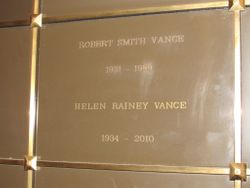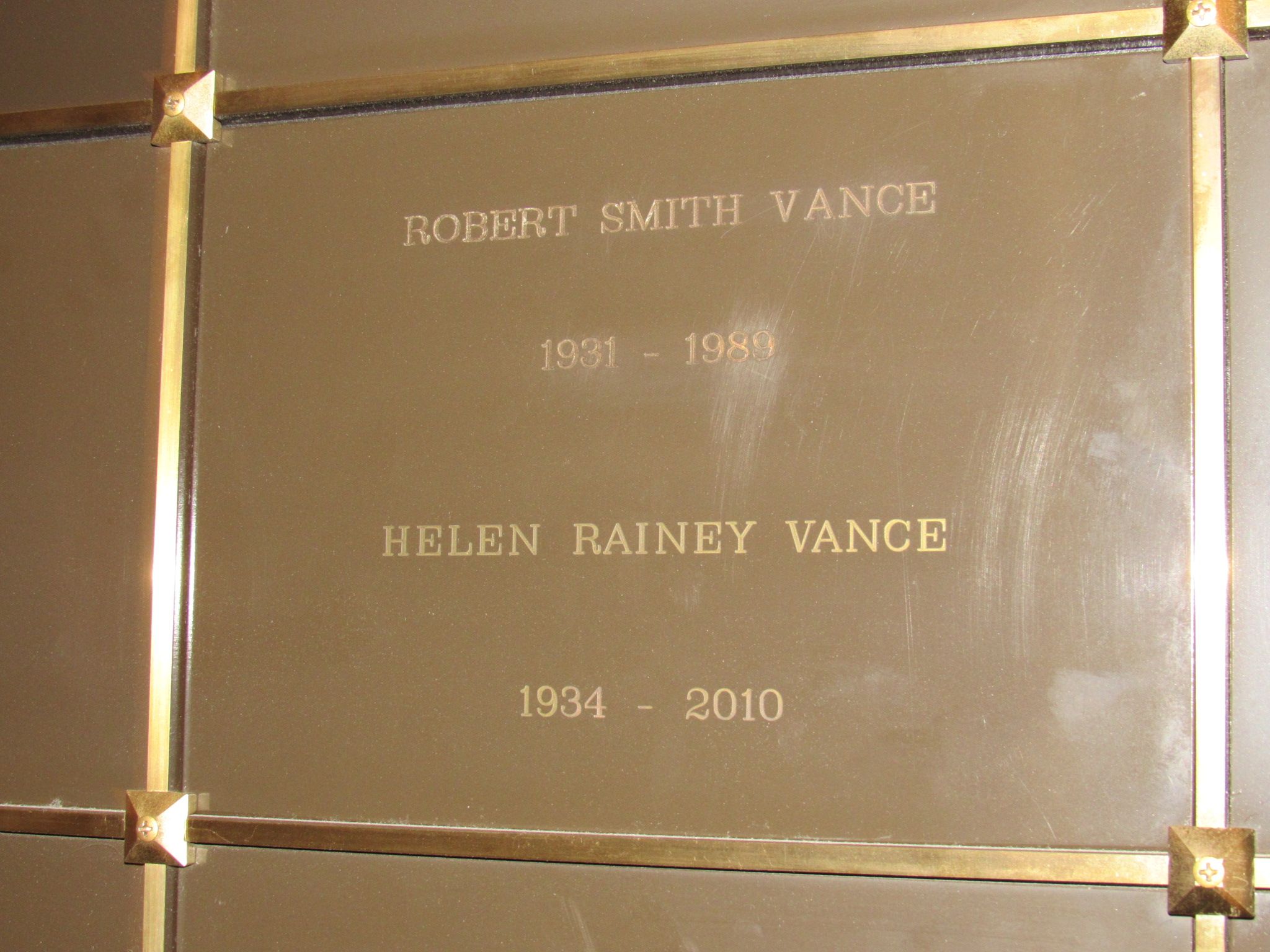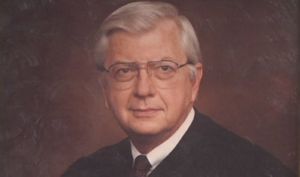Born in Talladega, Alabama, Vance was the youngest of four children born to parents Harrell T. and Mae (Smith) Vance. He grew up in Birmingham, Alabama, graduating from Woodlawn High School. He then received a B.S. from the University of Alabama in 1950, and a J.D. from University of Alabama School of Law in 1952. While at Alabama, Vance was purportedly the head of a secret yet powerful inter-fraternity organization known as 'The Machine,' and was elected President of the Student Government Association. After earning his law degree, Vance entered military duty as an attorney on the United States Army Judge Advocate General Corps, and was stationed at the Pentagon. One of his first assignments was to serve on the team of lawyers defending the Army in hearings against charges brought by Senator Joseph McCarthy.
After his military service, Vance received an LL.M. from George Washington University Law School in 1955 and served as a law clerk to Alabama Supreme Court Justice James Mayfield. He then served a one-year stint as an attorney for the U.S. Labor Department before entering private practice in Birmingham from 1956 to 1977.
As a lawyer, Vance sided with the developing civil rights movement, as shown in his participation as an intervening plaintiff in litigation that resulted in the U.S. Supreme Court decision in Reynolds v. Sims, which decided that state legislative districts had to be roughly equal in population. Vance was the first notable Birmingham attorney to reject the unwritten "gentleman's agreement" by which all black members of a jury pool were eliminated from serving as jurors in civil cases.
Vance served as Chairman of the Alabama Democratic Party from 1966 to 1977. His election as Chairman capped a struggle within the Alabama Democratic Party, as a group loyal to the national party wrested control from a states' right faction loyal to Governor George Wallace. Throughout Vance's tenure as chairman, Wallace was never able to capture the state party organization, despite continual struggles between the two factions.
Vance was a lecturer at the Cumberland School of Law at Samford University from 1967 to 1969. He served for a number of years in the U.S. Army Reserve, retiring as a lieutenant colonel. On November 4, 1977, Vance was nominated by President Jimmy Carter to a seat on the U.S. Court of Appeals for the Fifth Circuit being vacated by Walter Pettus Gewin. Vance was confirmed by the U.S. Senate on December 15, 1977, and received his commission the same day. The jurisdiction of the Fifth Circuit at that time included six Southern states, including Alabama. In 1981, the territory of the Fifth Circuit was divided into two circuits, and on October 1, 1981, Vance was reassigned to the U.S. Court of Appeals for the Eleventh Circuit, on which he served until his death.
On December 16, 1989, Vance was killed at his home in Mountain Brook, Alabama by a cowardly act when he opened a package containing a mail bomb. He was killed instantly and his wife, Helen, was seriously injured. After an intensive investigation, the federal government charged Walter Leroy Moody, Jr. with the murders of Judge Vance and of Robert E. Robinson, a black civil rights attorney in Savannah, GA, who had been killed in a separate explosion. Moody was charged with mailing bombs that were defused at the Eleventh Circuit's headquarters and at the Jacksonville office of the NAACP. Moody served four years in federal prison.
Moody had been convicted in 1972 of the possession of a bomb that had exploded in his son's house. Prosecutors speculated that Moody's motive for killing Judge Vance was revenge against Moody's trial for murder and related crimes, presided over by Judge Edward J. Devitt of the District of Minnesota. Moody was convicted on all counts. He was sentenced to seven federal life terms. An Alabama state-court jury convicted Moody of Judge Vance's murder and he was sentenced to death in 1997. Moody remains on death row at the Holman Correctional Facility near Atmore, Alabama. He entered death row on February 13, 1997.
In 1990, Congress passed H.R. 3691, a bill sponsored by Ben Erdreich renaming the federal building and courthouse in Birmingham, Alabama, as the Robert S. Vance Federal Building and United States Courthouse in memory of Judge Vance. Also in tribute to Judge Vance's service, the Atlanta chapter of the Federal Bar Association hosts an annual Robert S. Vance Forum on the Bill of Rights.
Vance's older son, Robert Vance, Jr., serves as a state circuit court judge in Birmingham, having first been appointed to that position in November 2002 and elected in 2004. He was the Democratic candidate for Chief Justice of Alabama's Supreme Court in the 2012 election, running against the controversial Republican Roy Moore. His younger son is a doctor in North Carolina. Vance's daughter-in-law, Joyce Vance, was named U.S. Attorney for the Northern District of Alabama in July 2009.
Born in Talladega, Alabama, Vance was the youngest of four children born to parents Harrell T. and Mae (Smith) Vance. He grew up in Birmingham, Alabama, graduating from Woodlawn High School. He then received a B.S. from the University of Alabama in 1950, and a J.D. from University of Alabama School of Law in 1952. While at Alabama, Vance was purportedly the head of a secret yet powerful inter-fraternity organization known as 'The Machine,' and was elected President of the Student Government Association. After earning his law degree, Vance entered military duty as an attorney on the United States Army Judge Advocate General Corps, and was stationed at the Pentagon. One of his first assignments was to serve on the team of lawyers defending the Army in hearings against charges brought by Senator Joseph McCarthy.
After his military service, Vance received an LL.M. from George Washington University Law School in 1955 and served as a law clerk to Alabama Supreme Court Justice James Mayfield. He then served a one-year stint as an attorney for the U.S. Labor Department before entering private practice in Birmingham from 1956 to 1977.
As a lawyer, Vance sided with the developing civil rights movement, as shown in his participation as an intervening plaintiff in litigation that resulted in the U.S. Supreme Court decision in Reynolds v. Sims, which decided that state legislative districts had to be roughly equal in population. Vance was the first notable Birmingham attorney to reject the unwritten "gentleman's agreement" by which all black members of a jury pool were eliminated from serving as jurors in civil cases.
Vance served as Chairman of the Alabama Democratic Party from 1966 to 1977. His election as Chairman capped a struggle within the Alabama Democratic Party, as a group loyal to the national party wrested control from a states' right faction loyal to Governor George Wallace. Throughout Vance's tenure as chairman, Wallace was never able to capture the state party organization, despite continual struggles between the two factions.
Vance was a lecturer at the Cumberland School of Law at Samford University from 1967 to 1969. He served for a number of years in the U.S. Army Reserve, retiring as a lieutenant colonel. On November 4, 1977, Vance was nominated by President Jimmy Carter to a seat on the U.S. Court of Appeals for the Fifth Circuit being vacated by Walter Pettus Gewin. Vance was confirmed by the U.S. Senate on December 15, 1977, and received his commission the same day. The jurisdiction of the Fifth Circuit at that time included six Southern states, including Alabama. In 1981, the territory of the Fifth Circuit was divided into two circuits, and on October 1, 1981, Vance was reassigned to the U.S. Court of Appeals for the Eleventh Circuit, on which he served until his death.
On December 16, 1989, Vance was killed at his home in Mountain Brook, Alabama by a cowardly act when he opened a package containing a mail bomb. He was killed instantly and his wife, Helen, was seriously injured. After an intensive investigation, the federal government charged Walter Leroy Moody, Jr. with the murders of Judge Vance and of Robert E. Robinson, a black civil rights attorney in Savannah, GA, who had been killed in a separate explosion. Moody was charged with mailing bombs that were defused at the Eleventh Circuit's headquarters and at the Jacksonville office of the NAACP. Moody served four years in federal prison.
Moody had been convicted in 1972 of the possession of a bomb that had exploded in his son's house. Prosecutors speculated that Moody's motive for killing Judge Vance was revenge against Moody's trial for murder and related crimes, presided over by Judge Edward J. Devitt of the District of Minnesota. Moody was convicted on all counts. He was sentenced to seven federal life terms. An Alabama state-court jury convicted Moody of Judge Vance's murder and he was sentenced to death in 1997. Moody remains on death row at the Holman Correctional Facility near Atmore, Alabama. He entered death row on February 13, 1997.
In 1990, Congress passed H.R. 3691, a bill sponsored by Ben Erdreich renaming the federal building and courthouse in Birmingham, Alabama, as the Robert S. Vance Federal Building and United States Courthouse in memory of Judge Vance. Also in tribute to Judge Vance's service, the Atlanta chapter of the Federal Bar Association hosts an annual Robert S. Vance Forum on the Bill of Rights.
Vance's older son, Robert Vance, Jr., serves as a state circuit court judge in Birmingham, having first been appointed to that position in November 2002 and elected in 2004. He was the Democratic candidate for Chief Justice of Alabama's Supreme Court in the 2012 election, running against the controversial Republican Roy Moore. His younger son is a doctor in North Carolina. Vance's daughter-in-law, Joyce Vance, was named U.S. Attorney for the Northern District of Alabama in July 2009.
Gravesite Details
inside columbarium







